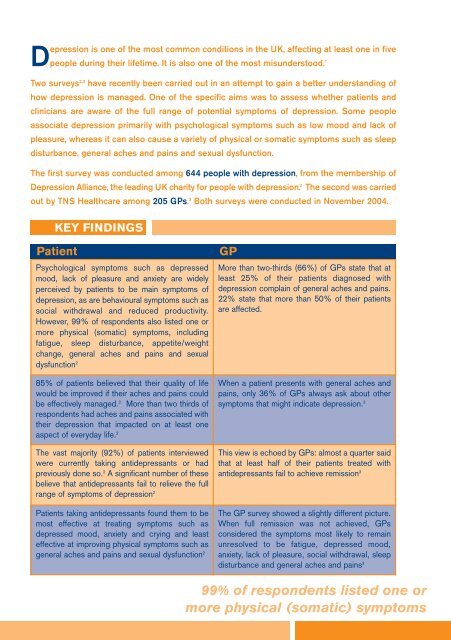Pulling Together - Seroxat Secrets
Pulling Together - Seroxat Secrets
Pulling Together - Seroxat Secrets
Create successful ePaper yourself
Turn your PDF publications into a flip-book with our unique Google optimized e-Paper software.
Depression is one of the most common conditions in the UK, affecting at least one in five<br />
people during their lifetime. It is also one of the most misunderstood. 1<br />
Two surveys 2,3 have recently been carried out in an attempt to gain a better understanding of<br />
how depression is managed. One of the specific aims was to assess whether patients and<br />
clinicians are aware of the full range of potential symptoms of depression. Some people<br />
associate depression primarily with psychological symptoms such as low mood and lack of<br />
pleasure, whereas it can also cause a variety of physical or somatic symptoms such as sleep<br />
disturbance, general aches and pains and sexual dysfunction.<br />
The first survey was conducted among 644 people with depression, from the membership of<br />
Depression Alliance, the leading UK charity for people with depression. 2 The second was carried<br />
out by TNS Healthcare among 205 GPs. 3 Both surveys were conducted in November 2004.<br />
KEY FINDINGS<br />
Patient<br />
Psychological symptoms such as depressed<br />
mood, lack of pleasure and anxiety are widely<br />
perceived by patients to be main symptoms of<br />
depression, as are behavioural symptoms such as<br />
social withdrawal and reduced productivity.<br />
However, 99% of respondents also listed one or<br />
more physical (somatic) symptoms, including<br />
fatigue, sleep disturbance, appetite/weight<br />
change, general aches and pains and sexual<br />
dysfunction 2<br />
85% of patients believed that their quality of life<br />
would be improved if their aches and pains could<br />
be effectively managed. 2 More than two thirds of<br />
respondents had aches and pains associated with<br />
their depression that impacted on at least one<br />
aspect of everyday life. 2<br />
The vast majority (92%) of patients interviewed<br />
were currently taking antidepressants or had<br />
previously done so. 2 A significant number of these<br />
believe that antidepressants fail to relieve the full<br />
range of symptoms of depression 2<br />
Patients taking antidepressants found them to be<br />
most effective at treating symptoms such as<br />
depressed mood, anxiety and crying and least<br />
effective at improving physical symptoms such as<br />
general aches and pains and sexual dysfunction 2<br />
GP<br />
More than two-thirds (66%) of GPs state that at<br />
least 25% of their patients diagnosed with<br />
depression complain of general aches and pains.<br />
22% state that more than 50% of their patients<br />
are affected.<br />
When a patient presents with general aches and<br />
pains, only 36% of GPs always ask about other<br />
symptoms that might indicate depression. 3<br />
This view is echoed by GPs: almost a quarter said<br />
that at least half of their patients treated with<br />
antidepressants fail to achieve remission 3<br />
The GP survey showed a slightly different picture.<br />
When full remission was not achieved, GPs<br />
considered the symptoms most likely to remain<br />
unresolved to be fatigue, depressed mood,<br />
anxiety, lack of pleasure, social withdrawal, sleep<br />
disturbance and general aches and pains 3<br />
99% of respondents listed one or<br />
more physical (somatic) symptoms


